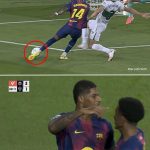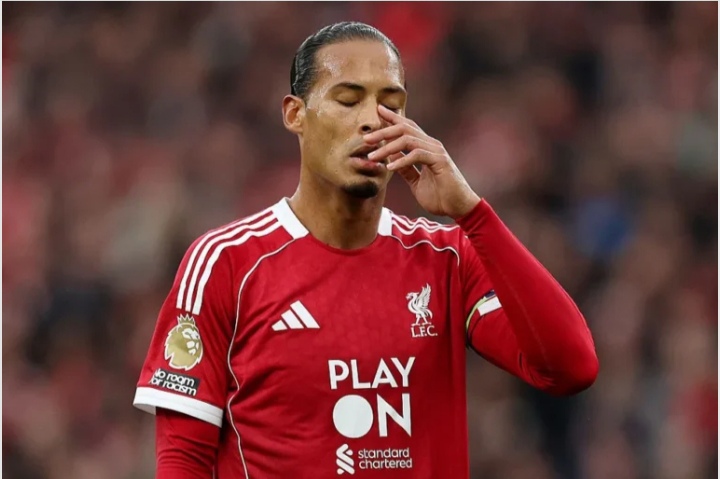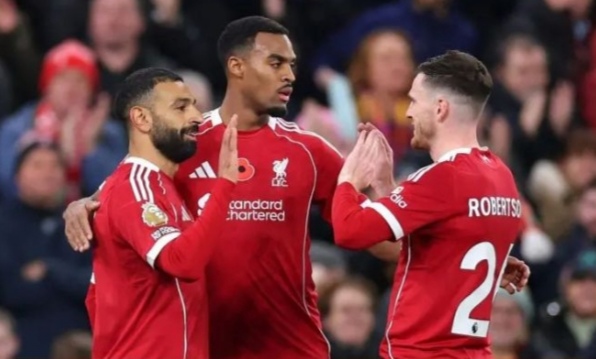The lights at Anfield glowed brighter than ever that night—the kind of brilliance that signals something unforgettable is about to unfold. Liverpool, weighed down by weeks of misery and six losses in seven games, arrived desperate to rediscover themselves. Arne Slot, still new in the job, had seen his promising start crumble under doubt and criticism. But under those famous red lights, with the Kop singing louder than the scars of the past month, something stirred again. Liverpool were home, facing Aston Villa—a brave, well-drilled side under Unai Emery, dangerous enough to trouble anyone in the league. Yet on this night, Liverpool remembered who they were. They won 2–0, though the score only hinted at the full story.
Before kickoff, tension filled the air like electricity. Every fan knew how much this meant. The Reds had fallen out of the top-four chase, their spark gone, their belief fading. Salah looked drained, Gravenberch uncertain, Mac Allister a shadow of the world champion he once was. But football is made for nights like this—nights of revival, of rediscovery, of redemption.
From the first whistle, it was clear: Liverpool were different. The pressing was back, the passing sharp, the fire in their eyes unmistakable. Aston Villa didn’t arrive to defend—they came to play. Early on, Morgan Rogers struck the crossbar, silencing Anfield for a split second. It was a warning. But instead of panicking, Liverpool stood taller. That scare lit a spark.
On the touchline, Arne Slot urged his players on—clapping, shouting, driving them forward. He knew this wasn’t just about three points. It was about belief, identity, and pride. Hugo Ekitike thought he’d scored when his header found the net, only for the flag to rise. The Kop groaned, but the noise didn’t fade. It felt inevitable—Liverpool were going to break through.
And then came the moment that reminded everyone why Mohamed Salah still rules Anfield.
Villa tried to play out from the back, with Emiliano Martínez passing casually between his defenders. But a poor touch gave Salah his chance. One precise touch, one ruthless finish—and the net rippled. Anfield erupted. Goal number 250 in a Liverpool shirt. Two hundred and fifty memories of brilliance. Salah didn’t go wild—he simply smiled, arms wide, soaking in the moment. It wasn’t just a goal; it was a statement.
The Kop roared his name, louder than ever—“Mo Salah! Mo Salah! Mo Salah running down the wing!” The anthem of a king reborn. The energy in the stands was pure belief. For the first time in weeks, Liverpool felt alive again. Salah was back—dangerous, confident, untouchable. Lucas Digne couldn’t cope. Every touch from Salah carried threat, every run drew fear. The legend wasn’t done—not even close.
Halftime came with cautious optimism. Liverpool led, but the job wasn’t finished. In the dressing room, Slot’s message was clear: kill the game, prove this is who we are. The players listened.
Thirteen minutes into the second half, Ryan Gravenberch seized his moment. The Dutchman, so often criticized for inconsistency, picked up the ball and took a chance. His shot, deflected twice, spun past Martínez into the net. Anfield exploded again. 2–0. Relief, joy, and redemption all at once.
Gravenberch sprinted to the crowd, arms open, roaring with pride. For weeks, he’d been doubted—called too slow, too casual. But this was his response: powerful, passionate, fearless. He wasn’t just scoring; he was reclaiming himself.
For Salah and Gravenberch, it was a night of rebirth. Both had been under fire—Salah for fading form, Gravenberch for underperforming. But in ninety minutes, they reminded everyone that class doesn’t vanish—it waits for the right moment to return. Salah led like a veteran, sharp and unselfish. Gravenberch played with control and elegance reminiscent of his Ajax days.
Yet, amidst all the headlines, one man quietly conducted the orchestra: Alexis Mac Allister.
Wearing number 10, the Argentine played with grace and grit. He was everywhere—passing, tackling, creating, leading. His assist for Gravenberch’s goal was perfectly timed, and his intelligence elevated everyone around him. It was a display that showed exactly why Liverpool signed him, and why Slot trusts him completely.
Mac Allister wasn’t loud, but he dictated the rhythm of the game. Sixty-four touches, forty-eight completed passes, three big chances created. Whenever Liverpool looked shaky, he restored calm. When Villa countered, he broke their flow. It was leadership without ego, excellence without noise.
Defensively, he was tireless—winning duels, intercepting plays, protecting the back line. When Gravenberch scored, his smile said it all: he had seen the play, made it possible, orchestrated the moment. When Salah scored his record goal, Mac Allister was the first to embrace him. That’s who he is—a quiet leader, a fighter who lets his football speak.
Journalist Will Rooney captured it best: he rated Mac Allister 9/10—higher than Salah or Gravenberch—writing that he “looked much more like his usual self” and “kept on showing his class.” The stats agreed: most chances created, most passes completed, endless heart.
When the whistle blew, Anfield rose as one. The fans weren’t just celebrating a win—they were celebrating a rebirth. For weeks, Liverpool had lost their identity, but under the bright lights and with the Kop singing You’ll Never Walk Alone, they found it again. Salah smiled, Gravenberch lifted his arms to the sky, and Mac Allister applauded the crowd that had never stopped believing.
Arne Slot embraced each player. He knew this was more than three points—it was the start of something new. His tactics, his belief, his message had finally clicked. The energy was back. The spirit was real. Liverpool were alive again.
Aston Villa, to their credit, didn’t fold. Rogers, Watkins, Bailey—all tried to pierce the defense, but Virgil van Dijk was immense, commanding everything in front of him. Mamardashvili stood tall in goal, calm and composed. Every player contributed. Every man fought. That unity—that’s what made the night special.
This match wasn’t just about goals. It was about moments: Salah’s serene celebration, Gravenberch’s roar, Mac Allister’s quiet dominance. It was about belief restored, pride regained, and the enduring spirit of Liverpool Football Club.
As fans streamed out of Anfield, the message was clear: Liverpool were back. There’s still a journey ahead, but this felt like the night everything changed.
For Salah, it proved that greatness never fades.
For Gravenberch, it was the start of a new chapter.
For Mac Allister, it was a masterclass in quiet leadership.
Anfield had its magic back. The songs, the fire, the soul—it was all there again.
Football has a way of giving back when you least expect it. And on this night, Liverpool received that gift—a 2–0 win that meant far more than the scoreline.
As Salah waved to the crowd and Mac Allister smiled beneath the lights, one thought echoed through the stands:
Liverpool are back—and they’re far from finished.










